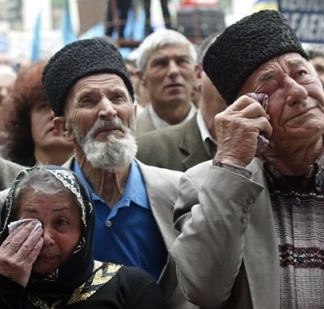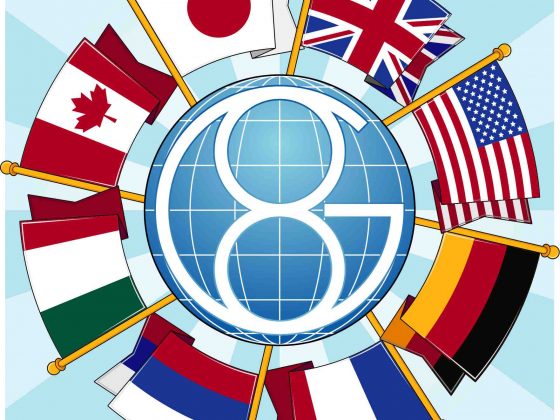All eyes are on Crimea, in Ukraine, where unidentified armed men have taken over local government buildings in the regional capital, Simferopol, hoisting Russian flags on the roofs and the Russian military has taken blocked two airports and the Ukrainian coast guard’s base, as well as some telecommunications. Acting Ukrainian President Oleksandr Turchynov announced that Russia is attempting to annex Ukrainian territory and is implementing the Abkhaz scenario in Crimea, while Andrei Illarionov, a senior fellow at the Cato Institute’s Center for Global Liberty and Prosperity, said that Putin wants to provoke large-scale civil war in Ukraine and is just waiting for the Ukrainians to respond to his provocative maneuvers in Crimea. In the Russian parliament, a law simplifying incorporation of foreign territories into Russia was tabled, and the Russian Foreign Ministry said the Russian Consulate in Crimea will begin issuing passports to members of the disbanded Ukrainian Berkut riot police.
Russia may be planning to take over Crimea, but several factors make it harder to believe that Russia will be able to establish control and to effectively annex Crimea as it did with South Ossetia, Abkhazia and Transnistria. For one, the Ukrainian side so far has not made any moves that Russia can credibly present as a provocation that necessitates armed response by the Russian side to “protect” its military or its citizens, as was the case in Georgia in 2008. The new Ukrainian government leaders have called for calm, the far right Right Sector said it will not be sending its men to Crimea, and in a conciliatory gesture to Russian-speakers, acting president Turchynov today vetoed the law the Ukrainian parliament adopted several days earlier repealing the 2012 law elevating the status of the Russian language. With the Security Council in session to discuss events in Crimea and Western leaders urging restraint and warning Russia that violations of Ukrainian sovereignty and territorial integrity are unacceptable, there is hope that a diplomatic solution to the crisis could be found.
But even if diplomacy fails and the Russian military seizes Crimean territory with the intention of controlling it permanently, it will be much harder for Russia to establish control of Crimea than it was in South Ossetia, Abkhazia and Transnistria. The main reason for this is the Crimean Tatars. The Tatars — a Muslim group that was deported en masse from Crimea by Stalin in 1944 and that for decades has waged a peaceful struggle for the right to return — have been coming back in droves since 1989. According to the latest Ukrainian census, from 2001, 243,433 Crimean Tatars account for 12.1 percent of the Crimean population of 2,033,700. They represent a highly mobilized and unified constituency that has consistently been pro-Ukrainian and opposed to pro-Russian separatism on the peninsula. Going back to the 1991 independence referendum, the narrow vote in favor of Ukrainian state independence in Crimea may have been thanks to the vote of the Crimean Tatars. Since then, the Crimean Tatars and their representative organ, the Mejlis, have cooperated with the pro-Ukrainian political parties. Leaders of the Mejlis such as Mustafa Dzhemilev and Refat Chubarov have been members of the Ukrainian parliament elected on the party list of Ukrainian nationalist parties such as Rukh in the 1990s and later from Our Ukraine party. On Feb. 26, the day before the Crimean parliament was taken over by the armed men, Crimean Tatars held a large rally near the parliament that was larger than a simultaneous pro-Russian rally. There has been no comparable local mobilized group opposed to Russian takeover in any other of the breakaway regions.
Although the group has been a staunch ally of the Ukrainian government against pro-Russian separatism on the peninsula, the Ukrainian central authorities, while benefiting from this support, have also been suspicious of the Crimean Tatars, who consider Crimea their historical homeland and have advocated measures such as changing the status of Crimean autonomy to make it the national-territorial autonomy of the Crimean Tatars as opposed to simply territorial (and de facto ethnic Russian autonomy given that ethnic Russians constitute more than 50 percent of the population in Crimea). The law on the status of the Crimean Tatars as indigenous peoples of Ukraine that the Tatar leaders have been pushing for many years remains unadopted.
Whatever the Tatar grievances against the Ukrainian state may be, when faced with the choice of being under either Russian or Ukrainian control, the Crimean Tatar leadership has consistently and unequivocally chosen Ukraine. Since the Soviet period, attempts to split the Crimean Tatar movement and persuade some of the Tatars to support a pro-Soviet, and later pro-Russian, agenda has not borne fruit. In an interview with this author in the 1990s, Mustafa Dzhemilev said that in 1991 Boris Yeltsin’s government made an offer to the Crimean Tatars to back Russian control of Crimea in return for giving the peninsula the status of Crimean Tatar national autonomy. Dzhemilev refused the offer then, and, in an interview with the author by phone from Crimea on Friday, he said that he has received a similar offer from a highly placed Russian official now, noting that the Crimean Tatars will not entertain such offers now, either, and that they do not trust Russia and want Crimea to remain within Ukraine. The Chairman of the Mejlis already issued a statement refusing to recognize the new local government in Crimea that was voted for by the local parliament yesterday with armed men in the building and reportedly without a quorum. Today, news media reported Dzhemilev’s statement that the Crimean Tatars are organizing self-defense units and that if diplomacy fails, the units would come under Ukrainian command and would fight the “aggressor” if necessary.
The Crimean Tatars are known for a history of nonviolent resistance, and Dzhemilev is a recipient of the UNHCR Nansen medal for his decades of peaceful struggle for the rights of the Crimean Tatars. So far, the Tatars have stayed off the streets, and their leaders, just as Ukrainian leaders in Kiev, have exercised a commendable degree of restraint. But if Russia does not back down and tries to annex and hold on to Crimea, it is certain to face sustained and mobilized opposition from the group.
See the original post © The Monkey Cage











